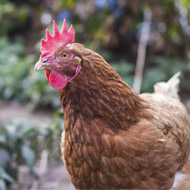
Proposals to adopt a more targeted approach
Defra has announced new plans to protect against avian influenza, as the current prevention zone requiring poultry and captive birds to be housed indoors is set to expire on 28 February.
The proposed temporary measures would allow birds outside, whilst still requiring keepers to take reasonable precautions to prevent avian influenza. Defra says a final decision will be confirmed at the end of February.
Under the new proposal, keepers of poultry and captive birds across England must continue to follow Defra’s biosecurity advice. Birds must still be separated from wild birds, but keepers may do so in one of the following ways:
- They may choose to keep their birds housed and, as a result, eggs and some poultry from these birds will no longer be free range.
- Keepers may construct covered runs or use netting to keep birds separate from wild birds. Eggs and poultry from these birds will be free range assuming they meet all other criteria.
- Keepers outside the ‘higher risk areas’ will be able to allow birds outside if certain strict biosecurity conditions are met. Eggs and poultry will be free range provided all other criteria is met.
Poultry keepers with other 1,000 birds will have to meet further biosecurity measures, including identifying clearly defined areas where access is limited and vehicles, equipment and footwear must be disinfected.
Any keepers planning to let their birds outdoors from 28 February must take steps to reduce the risk of infection, using Defra’s new guidance.
Defra says the risk of H5N8 remains high across the country but areas close to substantial inland or coastal bodies of water, where large numbers of wild birds gather, are at greatest risk. In these areas, compulsory housing or total netting will continue to be mandatory.
Guidance has been published on where these areas are likely to be, based on current risk levels. Around three quarters of poultry keepers are expected to be unaffected.
Chief veterinary officer Nigel Gibbens said: “Effective disease control will always be our priority. Based on the current situation, we believe mandatory biosecurity across England, combined with targeted housing or range netting in higher risk areas, is the best option to control disease, protect birds’ welfare and ensure consumers can buy free range products.
“We have acted swiftly to limit the spread of H5N8, including requiring all birds to be housed or kept separate from wild birds. The twelve week housing requirement has allowed keepers time to introduce stricter biosecurity measures and our intention now is to lift this from 28 February. Current rules on housing still remain in place until then, but we are setting out plans now to give people time to prepare. We will keep this decision under review.
“H5N8 continues to circulate in wild birds and poultry keepers must remain vigilant. This proposal does not mean a return to business as usual and we will continue to do everything we can to reduce the risk from this disease.”



 The latest
The latest